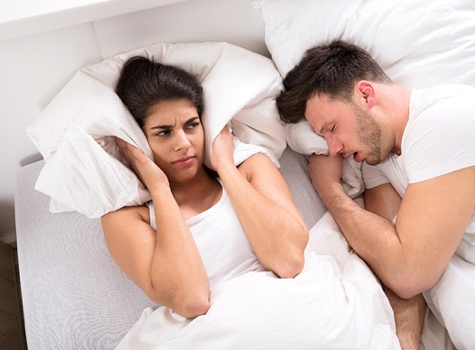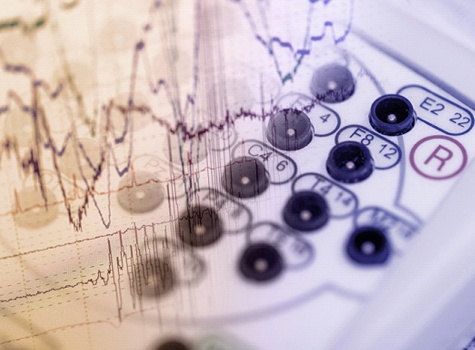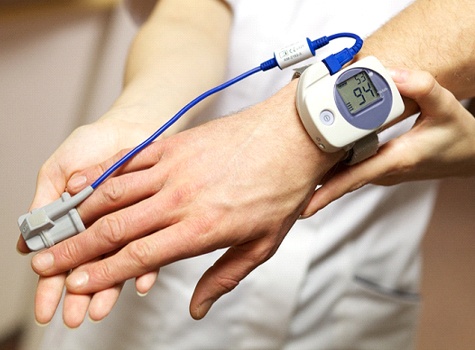Sleep Testing For Obstructive Sleep Apnea – Dallas, TX
A Step in the Right Direction
Knowing whether you have obstructive sleep apnea (OSA) or not requires more than just identifying possible symptoms. It also takes undergoing sleep testing in Dallas. As a form of medical test, the process allows us to further analyze the data retrieved and provide a formal diagnosis. Our team at Star Sleep & Wellness is here to help guide you through the process so that you can pursue treatment as soon as possible. Call us to schedule an appointment and inquire about sleep testing today.
Reasons Why I Need A Sleep Test

If you are suffering from obstructive sleep apnea (OSA), there is a high probability that you are also dealing with the following issues:
- Daytime fatigue and drowsiness
- Chronic snoring
- Ceased breathing that causes gasping when waking
- Insomnia
- Moodiness/depression
- Restless leg syndrome
- Forgetfulness
- Frequent headaches
Being able to identify that you are experiencing one or more of these problems is a great first step. However, it is essential for your overall health that you speak to your sleep doctor in Dallas about the possibility of a sleep test.
If after a thorough examination and questioning our team believes you would benefit from this type of medical testing, we will recommend a sleep test and provide you with an at-home device to use.
How An In-Lab Sleep Test Works

The most common forms of sleep testing are performed in a hospital or sleep laboratory. Although they are completely non-invasive, these studies allow doctors and technicians to monitor your brain and body activity while you sleep. Various monitors are attached to different parts of the body and retrieve important data throughout the night. When finished, the data is reviewed by a physician who can then determine if you do have OSA.
Who Is a Good Candidate for an In-Lab Sleep Study?
If you are suffering from any of the above-mentioned symptoms, you’re a likely candidate for a sleep study. In-lab sleep studies can be beneficial in monitoring brain activity, and it is a good solution if you suffer from other serious health conditions, as it provides a comprehensive approach. These studies also ensure that you do not accidentally disconnect any part of the device, as technicians will be overseeing your progress.
What Are the Advantages and Disadvantages of an In-Lab Sleep Study?
When it comes to an in-lab sleep study, there are certain advantages and disadvantages, such as:
- You don’t have to do any of the work. Lab technicians take care of connecting you to the device.
- It gathers additional data that can help diagnose OSA, especially if you have other health problems that might coincide with restless sleep.
- It is less convenient, as you’ll be required to commute to the laboratory and sleep in their facility.
- It does require being connected to various cords and devices, which might be uncomfortable for some patients.
How A Take-Home Sleep Test Works

At Star Sleep & Wellness , we recommend a take-home sleep test. Using the WatchPAT® ONE device, we will provide you with the test during your first appointment. Worn just like a regular watch, it also contains a finger probe and sensor that is applied near the center of your chest. Capable of syncing to the downloadable smartphone app, the raw data (i.e., sleep time, sleep staging, detection of apnea events, oxygen and heart rate, snoring and body position, and respiratory indicators) is transferred to the cloud instantly once the test is complete. This allows us to interpret the study and recommend the appropriate method of treatment.
Who Is a Good Candidate for a Take-Home Sleep Study?
If you prefer to avoid the idea of going elsewhere to undergo testing for your sleep apnea, a take-home test might be right for you. Oftentimes, patients like yourself may feel awkward having someone watch them sleep. This can be especially hard for those who have trouble lying still for prolonged periods or who suffer from other physical health issues that make sleeping in a bed other than your own difficult.
What Are the Advantages and Disadvantages of a Take-Home Sleep Study?
The advantages and disadvantages that come with a take-home sleep study include:
- The device is small enough not to be a nuisance while sleeping.
- It doesn’t require endless cords and machines like that of an in-lab sleep study.
- The data is immediately uploaded and accessible.
- The WatchPAT® ONE device is disposable, so you don’t have to worry about bringing it back to the office.
- It is possible that the finger sensor might slip off while asleep, which can cause issues with data analysis.
- There is no one to monitor you while you sleep to ensure all the pieces remain firmly in place.
